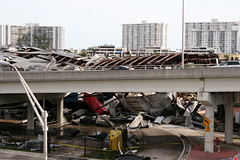 Now that we’ve completely trashed Foreign Minister Taro Aso’s political qualifications, it’s time to look at Shinzo Abe, the new Chief Cabinet Secretary and Minister of State for Taking Over After Koizumi, shown here in all-out “I’m gonna be a world leader someday!” mode.
Now that we’ve completely trashed Foreign Minister Taro Aso’s political qualifications, it’s time to look at Shinzo Abe, the new Chief Cabinet Secretary and Minister of State for Taking Over After Koizumi, shown here in all-out “I’m gonna be a world leader someday!” mode.
Like Koizumi, Abe is a popular guy. Also like Koizumi, he enjoys ruffling feathers, whether it’s advocating a tougher defense policy or visiting Yasukuni Shrine. He is often described as “hawkish,” although I think that word is a bit loaded. He’s certainly confrontational, though: his fame comes from negotiations with North Korea over the abductee issue, in which he refused to take much crap.
Like Aso, he has a political pedigree, although it doesn’t go too far back. Abe’s father Shintaro Abe was Secretary-General of the LDP and served in the Nakasone cabinet back in the mid-80’s. His maternal grandfather Nobusuke Kishi was Prime Minister in the late 1950’s and younger brother of Prime Minister Eisaku Sato, who won the Nobel Peace Prize. Kishi and Sato were both rags-to-riches stories, so Abe’s political lineage ends there.
He started out at Kobe Steel after college, then worked his way into the bureaucracy and became his father’s secretary during the elder Abe’s tenure as Secretary-General. After his father died in 1991, he ran for the empty seat representing Yamaguchi Prefecture, won it, and slipped from the administration into the government.
The Chief Cabinet Secretary position, a combination of press secretary and chief of staff, gives Abe an excellent platform to become even more well-known to the people (many CCSes have gone on to become prime ministers, most recently the late Keizo Obuchi). But he shouldn’t need too much help: he’s already way ahead of the field in opinion polls. Abe has been getting some blogger support too: Lord Curzon is a longtime fan, for one.
Koizumi is using his great political capital to give the country a choice between a hard-ass and a wack-ass. This Yomiuri writer says it Japanese-style:
Koizumi, by including possible successors in the Cabinet, intends to let them compete with each other to come up with ideas and efforts for reform, a decision that suggests the prime minister is grooming an heir to inherit a shogunate named “reform.” … Koizumi, in his reshuffle, made it quite clear he wants this shogunate of reform to be inherited by Abe.
The choice is pretty obvious; hopefully the obvious choice will be made, so Japan doesn’t end up with a prime minister who’s obsessed with “floppies.”
CAVEAT: It could be one of those dark horses, too, like finance minister Sadakazu Tanigaki. But Abe is who just about everyone seems to want.

 Narita has expanded as far as it can go. Haneda, already the busiest airport in Asia, can’t go anywhere but further into the bay. Tokyo will eventually need a third airport, or so we’re told.
Narita has expanded as far as it can go. Haneda, already the busiest airport in Asia, can’t go anywhere but further into the bay. Tokyo will eventually need a third airport, or so we’re told.



 Article 20 of the Constitution of Japan says that “freedom of religion is guaranteed to all. No religious organization shall receive any privileges from the State, nor exercise any political authority… The State and its organs shall refrain from religious education or any other religious activity.” Article 89 further states that “no public money or other property shall be expended or appropriated for the use, benefit or maintenance of any religious institution or association, or for any charitable, educational or benevolent enterprises not under the control of public authority.”
Article 20 of the Constitution of Japan says that “freedom of religion is guaranteed to all. No religious organization shall receive any privileges from the State, nor exercise any political authority… The State and its organs shall refrain from religious education or any other religious activity.” Article 89 further states that “no public money or other property shall be expended or appropriated for the use, benefit or maintenance of any religious institution or association, or for any charitable, educational or benevolent enterprises not under the control of public authority.”